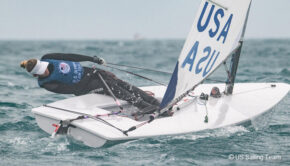Following the money within US Sailing
Published on March 23rd, 2023
When the relationship fractured between US Sailing Board of Directors and the leadership of the U.S. Olympic Sailing Program, among the issues was the allocation of money.
The result was significant resignations within the Olympic Program and the United States Sailing Foundation, an entity re-imagined in 2019 to support Youth Sailing and Olympic Sailing.
John Schoendorf, Treasurer for US Sailing, offers his observations:
I have devoted a substantial part of my life over the past 55 years to two passions of mine: sailing and forensic accounting. The friends I have made over the years racing Lightnings, Snipes, MORC, PHRF, the SORC, along with cruising all over the Bahamas, is about as good a list as anyone can wish for.
Professionally, I started my career in public accounting before becoming a CFO and spending my last 25 years in forensic accounting where I developed an acumen for fixing businesses. I was therefore honored when asked in 2018 to join US Sailing as a volunteer for US Sailing as its Treasurer, which provided the ability to use my professional experiences to serve the sport I absolutely love.
US Sailing has done a great deal of good over the years supporting our Olympic athletes, educating sailors, encouraging safe sailing, introducing the wonders of sailing to those who might otherwise not be able to experience it, serving the offshore community, facilitating national championships, and more.
US Sailing services are broad and complex and the technologies and capabilities needed to support the sport have changed significantly over the years.
Up until a couple years ago, US Sailing had not been as professionally managed or financially sophisticated as our members or athletes deserved; the organization had been slow to adapt, and changes were overdue.
That is why I was pleased when the Board had the courage and discipline to make the tough decision to reinvent and professionalize the organization, which it did with the full support of the United States Olympic & Paralympic Committee.
We now have proven sports leadership with professionally trained staff that is bringing US Sailing into the digital age to improve athlete support, member services, partner support, integrity, access to information, and customer service.
Unfortunately, recent US Sailing organizational changes have been conveyed inaccurately and are hurting the very people we are here to serve – the sailor athletes. Those in the know (or who are at least willing to be open-minded) can understand why we are justifiably proud of the significant improvements US Sailing is making and excited for what lies ahead.
We are grateful to the many athletes, industry leaders, the United States Olympic & Paralympic Committee (USOPC), and community members who have reached out to us and also to those who seek the facts before speaking out and have the courage to speak publicly in support of the direction we are heading.
Now to address the changes and some facts.
I would like to first acknowledge Paul Cayard and his team for their contribution over the past two years. Fundraising increased and much needed energy has been restored in the US Sailing Team. It is now time to further address the athletes’ needs.
As US Sailing President Rich Jepsen indicated in a Scuttlebutt interview, a variety of concerns had been raised regarding the Olympic operations. While it is not appropriate to get into details, I understand our members deserve the facts. The most troubling concerns came from US Sailing athletes themselves and were reinforced by similar concerns from the USOPC.
US Sailing’s legal obligation under the Ted Stevens Act requires that athletes be heard. Common sense also indicates that truly listening and supporting our sailor athletes is at the heart of our mission and critical to success on the podium.
Despite some accomplishments over the past two years, the many concerns raised by athletes and others were significant enough to mandate that changes be made (this gives you a window into the magnitude of the concerns). As you hear or read various opinions, please know that changes were not made lightly and remember, as someone once told me, “No matter how thinly you slice a pancake, there are always two sides.”
Another important question that has been raised has to do with the business model of the Olympic sailing program being integrated within US Sailing. The vast majority of National Governing Bodies (NGB) are structured in exactly the same way as US Sailing.
The USOPC, which oversees all NGBs and whose fundamental concern is the safety and development of Olympic athletes, believes that this structure is indeed best practice and has repeatedly indicated that US Sailing should be structured as it is. US Sailing remains in constant contact with the USOPC and continues to have its full support.
Given my role as a US Sailing Board member, Finance Committee Director, and 25 years as a forensic accountant, I can unequivocally attest to the significant amount of support provided to the Olympic operations thanks to it being successfully integrated within US Sailing and the appropriateness of having such closely woven operations.
As to the benefits of this model, US Sailing provides a ton of off-the-water support to facilitate the Olympic operations, as well as seamlessly handling the many, multifaceted, and significant operational and legal requirements mandated by Congress and the USOPC.
Many of these requirements and needed services are synergistic with US Sailing staff roles and aligned with US Sailing’s mission to support athletes in the best manner possible. This alignment enables the Olympic and high-performance teams to most efficiently obtain quality services.
Being part of one organization sharing operational services delivers significant benefits to the Olympic and high-performance teams that may not at first be obvious to the casual observer.
US Sailing’s services to the Olympic and high-performance areas include core business functions such as marketing, finance, fundraising, human resources, legal, compliance, insurance, information technology, and more.
For example, US Sailing handles all necessary finance department support (audits, taxes, reporting, etc.), obtains necessary visas for certain coaches, markets and promotes the Team, addresses USOPC concerns and requirements, ensures compliance with SafeSport, responds to Congressional requests for information, manages employee benefits and payroll, conducts background and conflict of interest checks, works with the USOPC to obtain necessary support and revenue for the Olympic Trials, generates sponsorship revenue, communicates with and serves sponsor needs, provides legal support for sponsor, athlete and other agreements, negotiates insurance coverage, and overall provides critical business infrastructure.
These services, which US Sailing gladly provides, are obviously needed to run our Olympic program and enable our high-performance colleagues to focus on their mission of developing elite athletes. Common sense clearly tells you that significant support is provided.
While US Sailing faces challenges created by the misinformation surrounding the recent necessary changes, I am excited about the future of the US Sailing Team and US Sailing and hope you are too. I encourage you to be part of the solution.
US Sailing is doing what good sailors do in turbulent times: remain calm, be true to your crew, do the right things, keep your eye on the mark and collectively navigate through to the finish line.
We ask you to be part of our crew: have an open mind, recognize the good that is happening, positively direct your passion, reach out to talk, and continue supporting our great sport and the athletes on our US Sailing Team.









 We’ll keep your information safe.
We’ll keep your information safe.